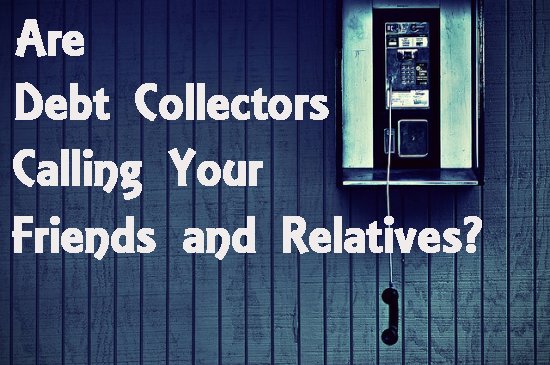
When you're behind on your bills and debt collectors are calling you at work, home and on your cell phone it can be embarrassing and stressful. But when they start calling your friends or family it goes to a whole new level of humiliation. According to the Fair Debt Collection Practices Act (FDCPA), debt collectors and creditors are only allowed to contact your references listed on credit applications and family members under very limited circumstances. Many times, they are violating federal law when they call anyone other than you about your debt. Here's what you need to know and how to protect yourself from aggressive debt collectors.
When can a debt collector contact a friend, relative or reference?
Any time you take on a debt, creditors usually ask for at least one reference that's not your spouse. The sole reason they do this is to have someone to call if you don't pay up. Even doctor's offices do this when they ask for a contact (other than a spouse) in case of emergency. That line on the form should say “in case you don't pay your bill.” Under FDCPA guidelines, they can only call your relative or friend under these limitations:
- A debt collector can only call your relative or friend one time then never again
- A debt collector can only call if they don't have your contact information
- A debt collector cannot tell them they are calling about a debt
- A debt collector must identify themselves by name but may only identify the company they work for if your friend or relative asks for it
- A debt collector may not leave a message for your friend or relative to call them back
- A debt collector may not ask your friend or relative to ask you to call them
Debt collectors violate these rules all the time
When debt collectors violate any of the above limitations, they're breaking the law. But what aggressive debt collection firms count on is that you will be too scared to fight back, won't know what they're doing is illegal or won't know how to fight back.
How to protect yourself from illegal debt collection tactics
If you are being called by debt collectors and you can't afford to pay the bill, you may want to talk to them once to see if you can work out an affordable payment arrangement. If you can't pay, write them a letter (send it certified mail with return receipt) and request they contact you only in writing and cease calling your home, work or cell. The good news is - the calls should stop.
The bad news is, this may push the debt collector to act illegally or pursue more serious legal action such as a lawsuit. If a debt collector does contact one of your relatives or friends and you know they have your contact info, they've broke then law. If they tell them they're collecting a debt or keep calling they're breaking the law. Here's what you need to do:
- Get the collector's contact information from your friend or relative
- Look at their caller ID to get the number and time of the call (snap a pic of the caller ID)
- Ask them exactly what the debt collector said
- Find out the name of the debt collection firm from your relative or by calling the number
- Find out how many times they called
- If they left an illegal voice mail, record it on your phone, so you have it
From there you can get an attorney and file an FDCPA claim. Debt collectors will have to pay a fine, damages to you and cover your legal costs if they violate the FDCPA. Many attorneys will accept a claim like this on a contingency basis - this means you don't pay them up front – they collect a percentage of the damages you're awarded. You can also file a complaint with the North Carolina Department of Justice (or whatever state you live in), the Federal Trade Commission or theConsumer Financial Protection Bureau.
